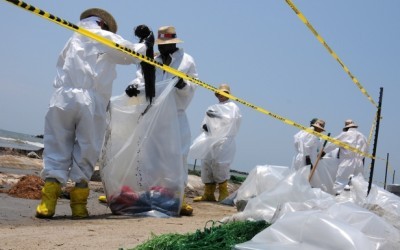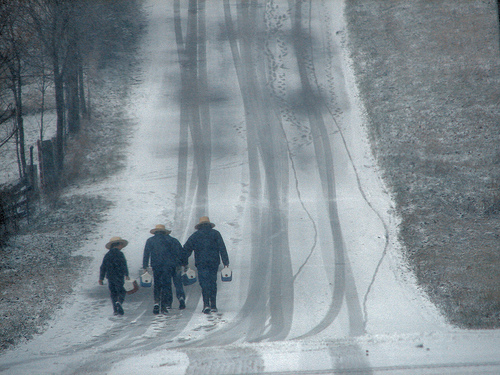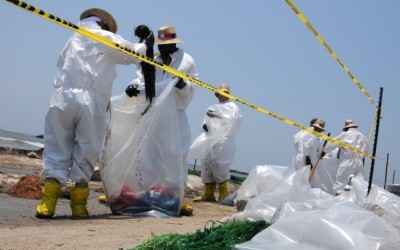 The life of the Macondo oil well might be over, but life goes on for residents living with the effects of the well’s disaster.Photo courtesy Deepwater Horizon Response via FlickrThe Macondo oil well is dead, but the saga of the BP oil leak goes on. Residents of the Gulf coast and the seafloor continue to struggle with the lingering effects of so much crude. So what’s in store for the Gulf? (Hopefully not another Deepwater Horizon.)
The life of the Macondo oil well might be over, but life goes on for residents living with the effects of the well’s disaster.Photo courtesy Deepwater Horizon Response via FlickrThe Macondo oil well is dead, but the saga of the BP oil leak goes on. Residents of the Gulf coast and the seafloor continue to struggle with the lingering effects of so much crude. So what’s in store for the Gulf? (Hopefully not another Deepwater Horizon.)
The AP reminds us that there is still oil in the water and that it’s washing onto the shore, causing problems for fishers in more than one way.
Many people are still struggling to make ends meet with some waters still closed to fishing. Shrimpers who are allowed to fish are finding it difficult to sell their catch because of the perception — largely from people outside the region — that the seafood is not safe to eat.
Like a scene from a science fiction movie, when the tide rolls in, oil is covered up by the new sediment washing onto beaches. But when that sediment heats up the oil bubbles to the surface, reports Bob Marshall for The Times-Picayune, and that bubbling crude still poses a threat for wildlife and humans.
While the most dangerous components of the oil — the volatile organic compounds — probably were weathered off long ago, what’s left still poses a mortal threat to any fish and wildlife that make contact, Overton said. And oil that was buried in sediments before being heavily weathered could still carry compounds proven to be carcinogenic to humans.
Fortunately, the Gulf was spared some of the worst-case scenarios that scientists predicted, NPR reports:
Small storms did propel some oil into Louisiana’s wetlands and onto the beaches of other Gulf states, but the big blanket didn’t come. Jane Lubchenco, who heads the National Oceanic and Atmospheric Administration, says even though hurricane season isn’t over yet, that risk is gone.
It’s not dead yet: The New York Times reports that even though BP successfully killed its Macondo oil well, companies might still make use of the reservoir that the well was pumping from.
Experts say that there are no technical or commercial reasons why BP — or another company if BP is wary of the political or public-relations repercussions — could not eventually produce oil from the formation, which BP once estimated contained about 50 million barrels of oil. The well spewed only about one-tenth of that amount, according to government estimates.
Can BP really let sleeping crude lie? We’ll see.
More green news:
Everything old is nuke again: Turns out there’s way more uranium available than scientists thought, enough to fuel 10 times as many reactors as exist today, according to an MIT study. [Christian Science Monitor]
Glowing pains: The German government is now very big on nuclear energy as a bridge to a fossil fuel free future. Germany is so high on nukes that it’s pushing a plan to extend the life of the country’s 17 nuclear plants. Tens of thousands of Germans gathered in Berlin over the weekend to say this is a very bad idea. [AFP]
Dim wits: Here’s a glimpse of the future if Republicans win the House. Rep. Joe Barton (R-Texas) has introduced legislation to save the energy-inefficient incandescent light bulb. Kate Sheppard has more on the GOP’s commitment to freedom of (light bulb) choice. [Mother Jones]
Set sale: Could the oceans be saved by selling them to private fishing industries? Chile might provide a case study. [Discovery]
Talking dirty [energy]: Major climate talks start this week, but don’t expect any major announcements. [AFP]




